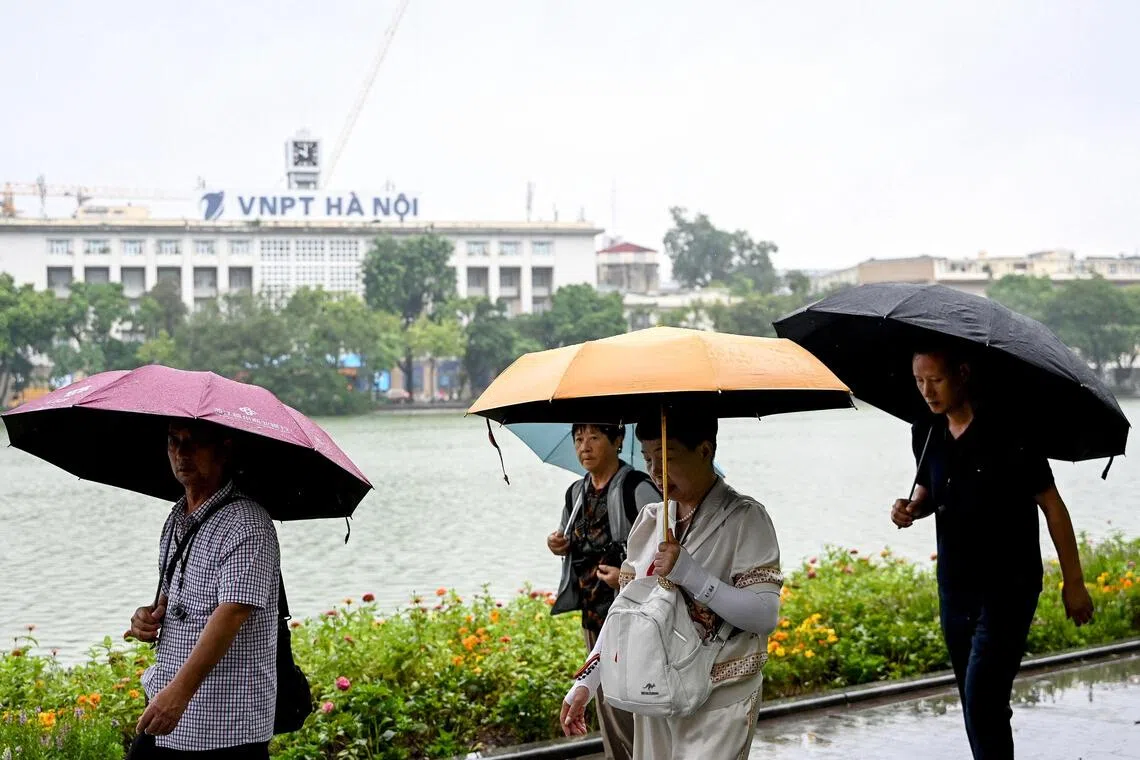Hanoi sees rise in dengue cases after heavy rain
Sign up now: Get insights on Asia's fast-moving developments

According to the Hanoi Centre for Disease Control, the city recorded 336 dengue fever cases in the past week.
PHOTO: AFP
HANOI — Prolonged heavy rain in Hanoi has heightened the risk of dengue fever in the local community in recent days, prompting increased monitoring and hospital admissions.
According to the Hanoi Centre for Disease Control, the Vietnamese capital recorded 336 dengue fever cases in the past week. Seventeen new outbreak clusters were detected, while 30 active dengue clusters are still being monitored across the city.
The National Hospital for Tropical Diseases has received a rising number of dengue patients, including several in critical condition with shock and severe bleeding.
One severe case involved a 56-year-old man from Lang Son province, who was transferred to the hospital’s emergency department after developing dengue shock syndrome. He initially had a high fever with chills, headache, fatigue, nausea and frequent vomiting.
After testing positive for dengue fever at a local facility, he was hospitalised for four days without improvement, prompting his transfer to the National Hospital for Tropical Diseases.
On the fifth day of illness, he developed purplish skin patterns on the abdomen, arms and legs, scattered subcutaneous bleeding, signs of infection and rapid breathing, and required oxygen support. Doctors diagnosed him with severe dengue fever with shock and administered intensive treatment immediately.
Another case involved a 63-year-old man from Hung Yen province. He had a fever of 38 deg C to 39 deg C, a severe headache and body aches for five days before admission. Despite taking fever-reducing medicine, his symptoms persisted, accompanied by gum bleeding and black stools.
After three days of treatment at a local facility without improvement, he was transferred to the National Hospital for Tropical Diseases. Four days later, his fever subsided, headache eased and platelet levels gradually improved.
Dr Nguyen Thanh Binh, deputy head of the Department of Virology and Parasitology, said: “Fortunately, the patient had not developed haemoconcentration and was diagnosed early, allowing timely treatment and avoiding serious complications.”
Following heavy rain and flooding caused by typhoons No. 10 and 11, mosquito density has increased, even in Hanoi. Dr Binh said the hospital is currently treating 17 dengue patients, all closely monitored every three hours.
Recent flooding and stagnant water in Vietnam’s northern provinces have created ideal conditions for Aedes aegypti mosquitoes to breed, raising the risk of dengue and other infectious diseases.
Dr Binh advised residents to eliminate mosquito larvae, cover water containers, clean living environments, use mosquito repellent, sleep under mosquito nets and spray insecticide regularly. He also recommended dengue vaccination, approved by the Ministry of Health, as a safe and effective preventive measure.
“People with chronic diseases such as diabetes, hypertension, heart or kidney disease, those with weakened immunity or obesity, the elderly and pregnant women are at higher risk of severe complications from dengue fever,” he said.
Dr Binh urged anyone with persistent high fever, headache, nausea, nose or gum bleeding, subcutaneous haemorrhages or prolonged diarrhoea to seek immediate medical care to prevent dangerous complications. VIETNAM NEWS/ASIA NEWS NETWORK


